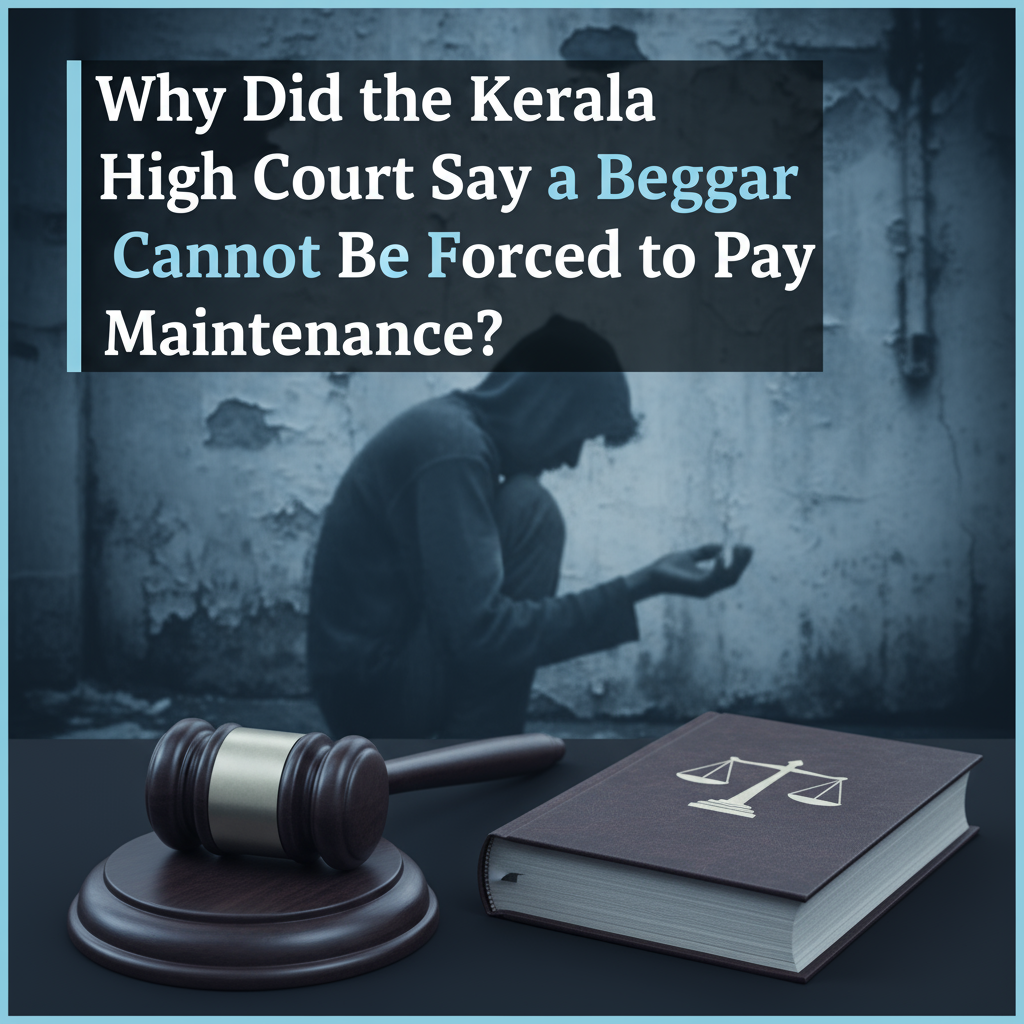Introduction – Kerala High Court on Maintenance: When Poverty and Law Collide
Ever wonder how the law deals with cases where the breadwinner literally depends on the kindness of strangers? The Kerala High Court on maintenance recently faced this tricky question. The court made it clear: you simply can’t force a beggar to write a cheque he doesn’t have. Justice P.V. Kunhikrishnan stressed that when a husband has nothing but alms to survive on, it’s the State’s job not the courts’ to step in and look after his wife.
Kerala High Court on Maintenance: What Sparked This Unusual Case?
The case reads like a tough social drama. In Malappuram, a wife went to court demanding ₹10,000 monthly from her blind husband. She claimed he wasn’t as poor as he seemed, saying he earned a decent sum through begging and small neighborhood errands. Still, the family court saw things differently and said, “Sorry, he can’t pay.” Not convinced, she took the matter to the Kerala High Court on maintenance, asking for a higher authority to give a second look.
Kerala High Court on Maintenance: Can a Hand that Begs Be Forced to Pay?
Here’s the crux Section 125 CrPC hinges on whether the husband can actually pay maintenance. The Kerala High Court on maintenance left no room for doubt: a man who makes his living from alms can’t be squeezed to support another. The bench leaned on a local saying “Don’t dip into the beggar’s bowl.” It’s a reminder rooted in reality: the court can’t turn poverty into a contractual obligation. Instead, it’s the government’s job to protect those left on the margins.
Kerala High Court on Maintenance: What About Abuse Allegations?
The wife didn’t just want money; she spoke of cruelty too. But the court raised eyebrows. How does a blind man physically hurt his sighted wife? Of course, cruelty can hide behind words and feelings, not just fists but the judge urged caution. He pointed out, these claims need real weight behind them before triggering maintenance orders, especially when the husband has no means. Sometimes, regular marital disputes get blown out of proportion in court, the judgment suggested.
Kerala High Court on Maintenance: Polygamy, Quranic Law, and Fairness
There was another twist the husband had already married twice and was rumored to threaten a third marriage. The court didn’t mince words. Drawing from Chapter 4 of the Quran, Justice Kunhikrishnan reminded everyone that polygamy is allowed only on the strict condition that the husband can treat all wives fairly, financially and otherwise. For someone who begs on streets, fairness isn’t just tricky it’s impossible. The Kerala High Court on maintenance was clear: rights under personal law come with responsibilities, and they can’t be excuses to deny justice or welfare.
Kerala High Court on Maintenance: What Does the State Have to Do?
Since the husband can’t pay, the court didn’t just throw up its hands. Instead, it ordered the State to look after her. Feed her, clothe her, shelter her. The Kerala Social Welfare Department was told to step in, and also to counsel the husband to keep him from recklessly marrying again. The judgment sends a strong message: courts won’t punish poverty by forcing the poor to support others beyond their means. But the vulnerable won’t be abandoned either they rely on government protection.
Conclusion – Kerala High Court on Maintenance: Final Thoughts on Capacity and Compassion
What’s the big takeaway here? Maintenance isn’t about turning every legal claim into cold cash demands. It’s about capacity. The Kerala High Court on maintenance showed that when capacity fails, compassion and constitutional duty kick in. The State has to fill the gap. The case teaches a crucial lesson for law students and professionals alike: the letter of the law must always be balanced against real human conditions. No point in ordering the impossible, but equally, no one should be left to suffer in silence.
Author Information:
By Karthikeyan Ganesan, a law student from KKC College of Law, reporting on law and technology for Nyayasphere. Karthikeyan always likes to stay updated with current trends and important information regarding the law and cases across the country.

